Share
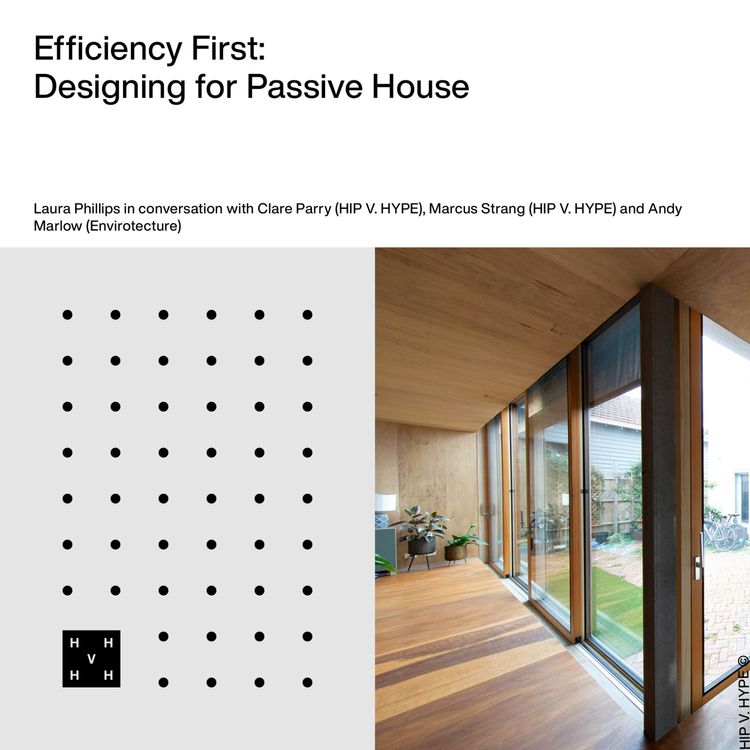
Hypecast
Efficiency First | Designing for Passive House
Originating in Germany in 1992, the Passive House methodology provides for energy efficient homes that support healthy indoor air quality and year-round thermal and acoustic comfort. Certified Passive Houses are underpinned by the five Passive House foundational principles of appropriate insulation, no uncontrolled air leakage, mechanical heat recovery ventilation, windows that insulate and seal and no thermal bridges.
In this episode, Laura Phillips, Head of Urban Advocacy at HIP V. HYPE sits down with Clare Parry, Better Buildings Lead at HIP V. HYPE and Founding Chair of Passive House Australia, Marcus Strang, Senior Consultant in the Better Buildings team at HIP V. HYPE and Andy Marlow, Architect at Envirotecture to discuss how to design a Passive House.
We respectfully acknowledge that Hypecast is recorded on traditional Aboriginal lands which have been sustained for thousands of years. We honour their ongoing connection to these lands, and seek to respectfully acknowledge the traditional custodians.
More episodes
View all episodes
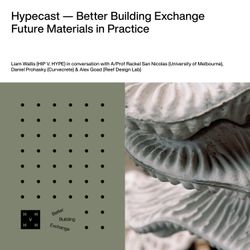
6. Low Carbon Concrete | Future Materials in Practice
49:21||Season 3, Ep. 6Concrete is the most widely used manufactured material on Earth — second only to water in global consumption — and one of the largest contributors to global carbon emissions. The race to develop and scale low-carbon alternatives is well underway, with the potential for an unprecedented reduction in CO₂ emissions.In this episode, HIP V. HYPE Founder Liam Wallis joins Rackel San Nicolas, Associate Professor - Electrical, Mechanical and Infrastructure Engineering, University of Melbourne; Daniel Prohasky, CEO, Curvecrete & Architectural Engineering Lecturer, Swinburne University of Technology and Alex Goad, Founder, Reef Design Lab. As material science rapidly advances, the challenge lies in translating innovation into real-world application. What technologies already exist? Do they actually work? And if so, why aren’t we seeing them widely adopted across the built environment?Join us for a live recording to separate fact from fiction and explore the role of low-carbon concrete in shaping a more sustainable built environment — and beyond.--We respectfully acknowledge that every project enabled or assisted by HIP V. HYPE in Australia exists on traditional Aboriginal lands which have been sustained for thousands of years. We honour their ongoing connections to these lands, and seek to respectfully acknowledge the Traditional Custodians in our work.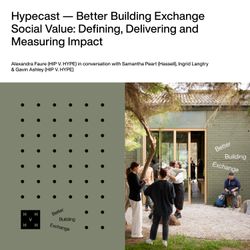
5. Social Value | Defining, Delivering and Measuring Impact
50:33||Season 3, Ep. 5Social value refers to the positive social, environmental, and economic impacts of a project beyond financial gains. However, there is currently no standardised way to define or measure social value in the built environment in Australia; this lack of clarity makes it hard to assess a project’s impact, maximise positive outcomes and ensure accountability.In this episode, HIP V. HYPE's Better Cities & Regions Associate Alexandra Faure joins Samantha Peart, Global Head of Sustainability, Hassell; Ingrid Langtry, Place & Experience Expert and Gavin Ashley, Head of Better Cities & Regions and a Director of Sustainability, HIP V. HYPE. As our society faces growing environmental and social challenges, a clearer, systematic approach is required to meaningfully incorporate social value into projects of all scales.Join us for a live recording to explore practical ways to define, deliver and measure meaningful social value for architects, planners, developers, builders, economists or citizens alike.--We respectfully acknowledge that every project enabled or assisted by HIP V. HYPE in Australia exists on traditional Aboriginal lands which have been sustained for thousands of years. We honour their ongoing connections to these lands, and seek to respectfully acknowledge the Traditional Custodians in our work.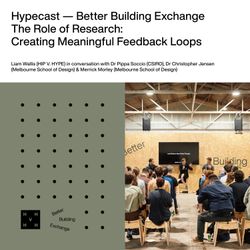
4. The Role of Research | Creating Meaningful Feedback Loops
54:15||Season 3, Ep. 4Too often neglected in the project cycle, post-occupancy research seeks to understand gaps between design intent and real-world performance. Energy use, indoor environmental quality (IEQ), user satisfaction, culture & community, unintended consequences (good & bad)…In this episode, HIP V. HYPE's Founder Liam Wallis joins Dr Pippa Soccio, Senior Research Scientist – Building Monitoring, CSIRO; Dr Christopher Jensen, Lecturer in Architecture, Building and Planning, Melbourne School of Design and Merrick Morley, PhD Candidate, Melbourne School of Design. Join us for a live recording to explore how integrating post-occupancy research can optimise building performance, enhance occupant experience and improve the longevity and resilience of our buildings.--We respectfully acknowledge that every project enabled or assisted by HIP V. HYPE in Australia exists on traditional Aboriginal lands which have been sustained for thousands of years. We honour their ongoing connections to these lands, and seek to respectfully acknowledge the Traditional Custodians in our work.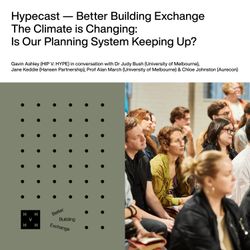
3. The Climate is Changing | Is Our Planning System Keeping Up?
01:03:50||Season 3, Ep. 3Climate resilience is the ability of social, economic, human engineered and natural systems to withstand and recover from hazardous climatic events while maintaining their core structures and functions. Climate change related hazardous events and associated risks are rapidly evolving. Victoria’s planning scheme is not keeping pace. A lack of coordination, continuity and investment in the best available data, inadequate integration of climate risk considerations and frankly the scheme’s inflexibility is hindering effective planning. In this episode, HIP V. HYPE's Head of Better Cities & Regions and Director of Sustainability Gavin Ashley joins Dr Judy Bush, Senior Lecturer in Urban Planning, University of Melbourne; Jane Keddie, Director, Hansen Partnership; Prof Alan March, Professor in Urban Planning, University of Melbourne and Chloe Johnston, Manager - Infrastructure Advisory, Aurecon. Join us for a live recording seeking to understand how our planning scheme can be better designed to adapt to the dynamic challenges of climate change to create a more resilient and prosperous future for all. --We respectfully acknowledge that every project enabled or assisted by HIP V. HYPE in Australia exists on traditional Aboriginal lands which have been sustained for thousands of years. We honour their ongoing connections to these lands, and seek to respectfully acknowledge the Traditional Custodians in our work.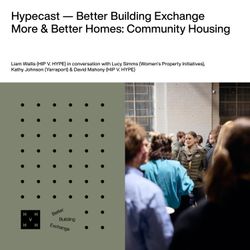
2. More & Better Homes | Community Housing
55:03||Season 3, Ep. 2Australia needs more housing, period. This is especially important in the community housing sector, and we applaud the efforts of governments to increase funding and set targets to seek to address the dire shortage. Community housing is secure, affordable, long term rental housing managed by not-for-profit organisations for people on low incomes or with special needs. Providers are registered and regulated by the state government.In seeking to rapidly increase supply, how do we ensure that the homes we build are optimised for high performance, reduced operational energy costs, improved health and comfort outcomes and increase resilience against impacts of climate change for the next 50-100 years…?In this episode, Founder of HIP V. HYPE Liam Wallis joins Lucy Simms, Chief Commercial Officer, Women's Property Initiatives; Kathy Johnson, Managing Director at Yarraport and David Mahony, Head of Better Buildings and a Director of Sustainability at HIP V. HYPE to explore immediate action to optimise alignment between affordability and sustainability for community housing. What are the barriers, what are the opportunities and where are our blind spots…?--We respectfully acknowledge that every project enabled or assisted by HIP V. HYPE in Australia exists on traditional Aboriginal lands which have been sustained for thousands of years. We honour their ongoing connections to these lands, and seek to respectfully acknowledge the Traditional Custodians in our work.
1. Collaboration & Capacity Building | Skills for a Better Future
01:14:18||Season 3, Ep. 1The built environment is responsible for 37 per cent of global energy-related greenhouse gas emissions. As we look to the future of our buildings, cities and regions, innovative, high-performance, low carbon design becomes crucial to achieving a better tomorrowIn this episode, former Habitus editor Nicky Lobo joins Liam Wallis, Founder of HIP V. HYPE; Andrew Maynard, Director at Austin Maynard Architects and Simon Clark, Founder of the Sustainable Builders Alliance to unpack how genuine collaboration and capacity building can reduce impact whilst supporting exceptional outcomes.--We respectfully acknowledge that every project enabled or assisted by HIP V. HYPE in Australia exists on traditional Aboriginal lands which have been sustained for thousands of years. We honour their ongoing connections to these lands, and seek to respectfully acknowledge the Traditional Custodians in our work.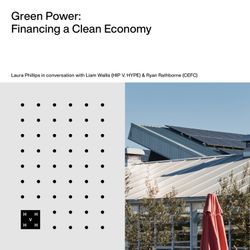
10. Green Power | Financing a Clean Economy
27:00||Season 2, Ep. 10How can finance be used to have a positive impact at scale? The Clean Energy Finance Corporation (CEFC) is helping to cut carbon emissions by investing $10 billion on behalf of the Australian Government – in agriculture, cleantech innovation, energy generation and storage, infrastructure, property, transport and waste. In this episode, Laura Phillips, Head of Urban Advocacy at HIP V. HYPE sits down with Liam Wallis, Director at HIP V. HYPE and Ryan Rathborne, Joint Head of Property at the Clean Energy Finance Corporation to discuss how clean finance can drive the shift to a clean energy economy. Click here to learn more about the work of the CEFC. We respectfully acknowledge that Hypecast is recorded on traditional Aboriginal lands which have been sustained for thousands of years. We honour their ongoing connection to these lands, and seek to respectfully acknowledge the traditional custodians.
8. Next Life | Repurposing Materials
32:46||Season 2, Ep. 8Construction sites generate an enormous amount of waste. Research from RMIT found that in 2017, 20.4 million tonnes of construction and demolition waste was generated in Australia. 33% of this waste went into landfills, with the rest either illegally dumped, stockpiled, recycled or reused. What if instead of sending these materials to landfill, they can be salvaged and repurposed for a second life including as joinery and furniture. Revival Projects is the only builder in Australia to hold domestic and commercial registration, whilst operating a 100% sustainable manufacturing facility, exclusively using recycled materials. In this episode, Laura Phillips, Head of Urban Advocacy at HIP V. HYPE, sits down with Rob Neville, founder of Revival Projects and Liam Wallis, Director at HIP V. HYPE to discuss how the construction industry can better repurpose materials and embrace the circular economy. More information on Revival Projects can be found here. We respectfully acknowledge that Hypecast is recorded on traditional Aboriginal lands which have been sustained for thousands of years. We honour their ongoing connection to these lands, and seek to respectfully acknowledge the traditional custodians.